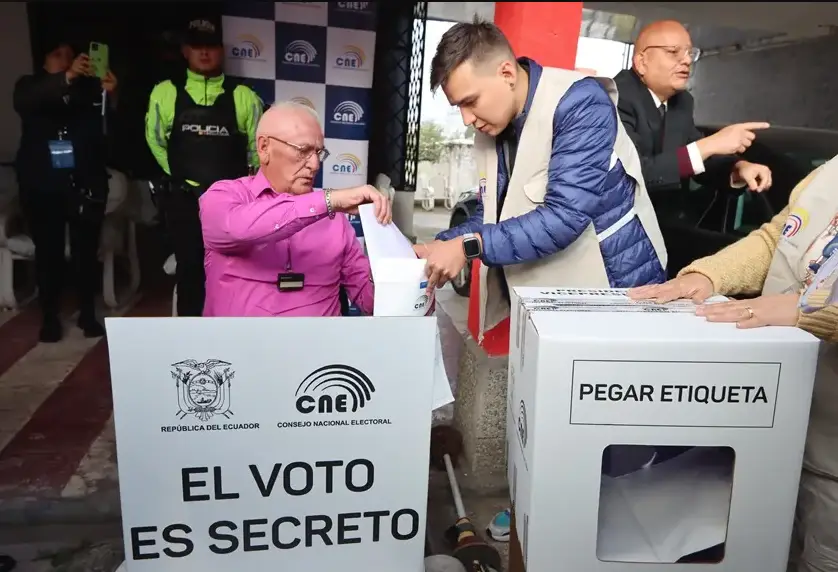In just three years, Ecuador has undergone four electoral processes—a dizzying pace that reflects the country’s deep political instability. Yesterday’s outcome in the first round confirms a familiar scenario: a rematch of the 2023 runoff.
On one side, Daniel Noboa, heir to one of the country’s most powerful business conglomerates, represents the continuity of a political project still under construction. On the other, Luisa González, an emblematic figure of the “pink tide” that swept through Latin America in the early 21st century, seeks to return Correísmo to power after two consecutive failed attempts in the presidential race.
Both candidates have garnered more than 88.62% of the votes, making this the most polarized first-round election in Ecuador since the return to democracy.
The Resurgence of Correísmo: Can Luisa González Break the Electoral Ceiling?
Correísmo, organized under the Revolución Ciudadana (RC) movement, has once again demonstrated its electoral resilience. Since Rafael Correa left office in 2017, the movement has faced bans, judicial persecution, and natural political wear after more than a decade in power. However, it remains one of the most well-organized political forces in the country, with strong support among popular and rural sectors, particularly in the coastal region, where RC is considered the only political alternative advocating for social protection policies.
This election marks a turning point. With Luisa González securing 44.17% of the vote, RC is at its strongest position since 2017. Unlike previous elections, where the electoral ceiling seemed insurmountable, today there is a real opportunity to surpass it.
A key factor in this process is Luisa González’s evolution as a political figure. In 2021, her emergence on the national stage was abrupt—she was a newcomer, and while she managed to establish herself as the candidate of Correísmo, her lack of experience prevented her from reaching beyond the movement’s core base. Today, her story is different. She has demonstrated greater experience and maturity, striving to build her own identity—one that not only relies on the legacy of the Revolución Ciudadana but also projects an autonomous and renewed leadership.
Furthermore, the current context plays in her favor. Ecuador is experiencing one of its deepest crises in decades, marked by insecurity, economic precarity, and political instability. In this scenario, the demand for stability and social protection has become central to voters’ decisions. For a significant portion of the population, Revolución Ciudadana (RC) remains the most credible option to restore a sense of order and security in the country.
Although the challenge of overcoming rejection votes and expanding its electoral base remains, the possibility of reclaiming the presidency is more real than ever. The support of a key ally like Leonidas Iza—an Indigenous leader with a significant electoral base and 4.76% of the vote in the first round—could be decisive. With this potential alliance and an effective strategy to attract undecided voters, Luisa González has a real chance to achieve what seemed impossible in 2021 and 2023: bringing Correísmo back to power.
Daniel Noboa: The strength of a leadership in progress
Despite 14-hour blackouts and an unprecedented security crisis—2024 ended as one of the most violent years, with 8,008 homicides—Daniel Noboa maintains remarkable popularity: 44.44% approval for an incumbent, a high figure given the current crisis.
His approval is not based on efficiency but on the perception of decisiveness. Actions like militarizing the streets or raiding the Mexican embassy have reinforced his image as a “president who takes action,” regardless of concrete results.
Even traumatic events, such as the disappearance of four children, have not weakened his support. In a society that has normalized violence, legality takes a backseat when what is demanded are immediate solutions, no matter the cost.
His support extends beyond anti-Correísta and the upper economic elites, attracting diverse sectors of society: women, young people, the middle and lower classes, and impoverished working-class communities seeking stability amidst chaos. One of the most revealing insights from sociologist Arlie Hochschild is that the working class does not necessarily reject the wealthy; on the contrary, they admire them when they perceive effort and success. What they value is upward social mobility and the chance to improve their own living conditions. However, they deeply distrust overeducated urban elites, whom they see as arrogant and disconnected from everyday reality.
According to Latinobarómetro 2024, many Ecuadorians still hope their personal situation will improve in the future, even though they remain skeptical about the country’s overall progress. This contradiction—individual optimism versus collective pessimism—helps explain Daniel Noboa’s deep-rooted appeal in the public imagination. His business success is not seen as inherited privilege but as a symbol of hope and a personalized promise: if he made it, perhaps others can too. This narrative strengthens his connection with broad sectors of the population, who see in his story a reflection of their own aspirations.
In an Ecuador deeply marked by rejection of the traditional political class and widespread distrust in institutions, Noboa not only represents the continuation of a political project that remains vague and full of contradictions, but he also embodies a leadership style perceived as fresh and detached from political traditionalism. For many, his figure has become a symbol of stability and renewal, reinforcing the idea of a “new Ecuador.”
Conclusion: A nation searching for direction
Beyond the differences between both candidates, what underlies this election is a shared demand: the need for order and stability in a country where violence, economic hardship, and institutional distrust have become everyday realities.
The polarization between Daniel Noboa and Luisa González—two figures who represent opposing political projects yet are equally embedded in the public imagination—highlights the deep tensions running through Ecuadorian society. This election will determine Ecuador’s political future and test the ability of its leaders to meet the expectations of a divided yet hopeful citizenry, united by a common desire for change.
*Machine translation proofread by Janaína da Silva.













